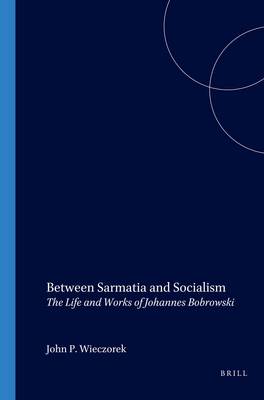
- Afhalen na 1 uur in een winkel met voorraad
- Gratis thuislevering in België vanaf € 30
- Ruim aanbod met 7 miljoen producten
- Afhalen na 1 uur in een winkel met voorraad
- Gratis thuislevering in België vanaf € 30
- Ruim aanbod met 7 miljoen producten
Zoeken
Omschrijving
Interest in Johannes Bobrowski (1917-1965) has suffered from an impression of the complexity of his works and of the narrowness of his focus: on 'The Germans and their Eastern European neighbours'. The current study re-examines aspects of Bobrowski's 'Sarmatian' works, especially their chronological development, but places them within the wider context of the whole of his oeuvre. It looks at the long period of development before he discovered his 'theme' in the early 1950s and examines his development after Sarmatische Zeit and Schattenland Ströme, seeing the volume Wetterzeichen as moving increasingly away from the past and towards more contemporary issues. His short stories and novels are related to the issues confronting him in East Germany and develop increasingly into responses to immediate poetic and social problems.
Far from being a remote and backward orientated 'Sarmatian', Bobrowski emerges as a writer attempting to communicate with a society which, he felt, threatened to ignore basic human needs and aspirations. The study makes use of material from Bobrowski's Nachlaß to present a figure looking for and offering patterns for orientation in his East German society, but with renewed relevance for post-unification Germany.
Far from being a remote and backward orientated 'Sarmatian', Bobrowski emerges as a writer attempting to communicate with a society which, he felt, threatened to ignore basic human needs and aspirations. The study makes use of material from Bobrowski's Nachlaß to present a figure looking for and offering patterns for orientation in his East German society, but with renewed relevance for post-unification Germany.
Specificaties
Betrokkenen
- Auteur(s):
- Uitgeverij:
Inhoud
- Aantal bladzijden:
- 284
- Taal:
- Engels
- Reeks:
- Reeksnummer:
- nr. 139
Eigenschappen
- Productcode (EAN):
- 9789042007567
- Verschijningsdatum:
- 1/01/2000
- Uitvoering:
- Paperback
- Formaat:
- Trade paperback (VS)
- Afmetingen:
- 155 mm x 234 mm
- Gewicht:
- 394 g

Alleen bij Standaard Boekhandel
+ 193 punten op je klantenkaart van Standaard Boekhandel
Beoordelingen
We publiceren alleen reviews die voldoen aan de voorwaarden voor reviews. Bekijk onze voorwaarden voor reviews.








